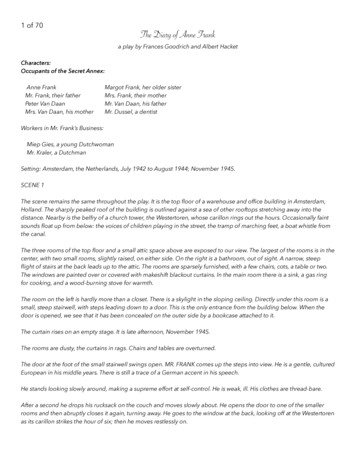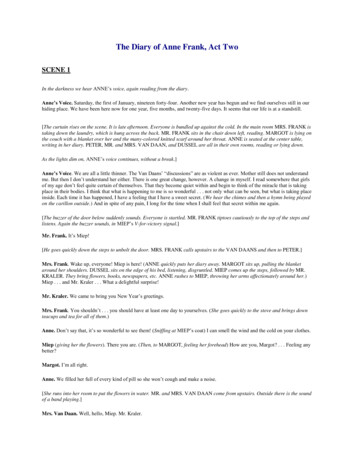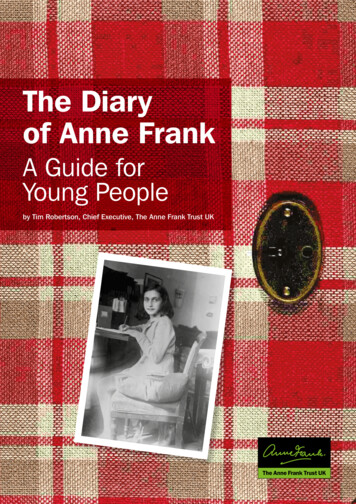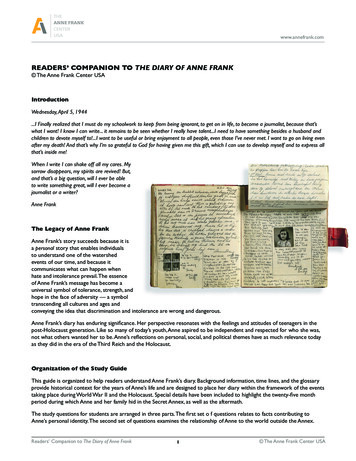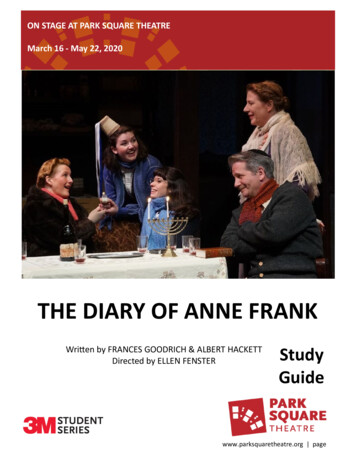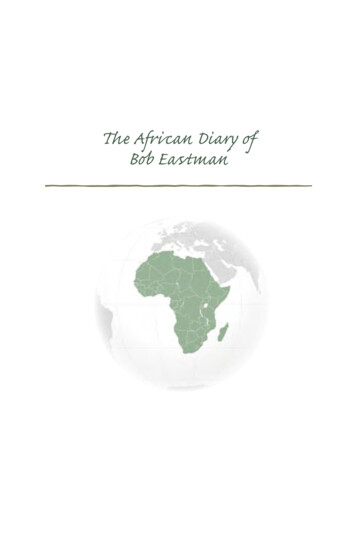
Transcription
The African Diary ofBob Eastman
Table of Contentsii
Table of ContentsThe African Diary ofBob EastmanBy Rick SappSafari Press
THE AFRICAN DIARY OF BOB EASTMAN 2013 by Rick Sapp. All rightsreserved. No part of this publication may be used or reproduced in any form or by anymeans without permission from the publisher.The trademark Safari Press is registered with the U.S. Patent and Trademark Officeand with government trademark and patent offices in other countries.Sapp, RickFirst editionSafari Press2012, Long Beach, CaliforniaISBN 978-1-57157-372-8Library of Congress Catalog Card Number: 201293099810 9 8 7 6 5 4 3 2 1Printed in ChinaReaders wishing to receive the Safari Press catalog, featuring many fine books onbig-game hunting, wingshooting, and sporting firearms, should write to Safari Press,P.O. Box 3095, Long Beach, CA 90803, USA. Tel: (714) 894-9080 or visit ourWeb site at www.safaripress.com.
Table of ContentsIntroduction by Bob Eastman . viChapter 1Jerry Does a Back Flip (1968).1Chapter 2Inside the Magic Kingdom (1969).18Chapter 3First Elephant: Showdown in Angola (1975).42Chapter 4Freedom (1975).57Chapter 5The Persistence of Memory (1980).67Chapter 6The Unlikely Combination (1980).81Chapter 7A Most Unusual Talent: An Interview with John Brooker (1980).100Chapter 8The Mentor (1982).115Chapter 9Why You Want a Lithuanian Backup (1982).129Chapter 10Dad. Son. Buffalo. (1991).138Chapter 11Going with the “Flo” (1997).151Chapter 12Learning to “Polish One’s Mouth” (2006). .165Chapter 13The Leopard and the Law (2006).181Chapter 14Confrontation in Tanzania—Elephant (2006). .198Chapter 15Rui on My Mind (2007).211Chapter 16A Place in History (2007).227Chapter 17The Jims: A Jim Named George (2007).244Chapter 18The Jims: A Jim Named Barcia (2007).263Chapter 19Jamie in Two Worlds (2010).285Addendum : What the Wife Knew.296Addendum : Eastman’s Africa, A Half-Century of Bowhunting.300Bibliography . 306
IntroductionWhen I began hunting in Africa nearly fifty years ago, I tooka gross of arrows and came home with an empty quiver.Now, after thirty trips to hunt on that continent, I taketwo dozen arrows and return with most of them. It is a matter, I think,of success, seasoning, and maturity.It was easy to fall in love with a place that, in the mid-twentiethcentury, we still thought of as the “Dark Continent.” Of course, bythen Africa had been thoroughly explored, mapped, and, in its ownway, civilized. After all, Stanley found the elusive and fatally ill, butnevertheless determined, David Livingstone—“Dr. Livingstone, Ipresume?”—nearly a century before my first hunt.Nevertheless, an image of high romance clung to Africa then,in part due to the imaginative storytelling of writers such as ErnestHemingway (The Snows of Kilimanjaro, The Green Hills of Africa) andRobert Ruark (Something of Value, Uhuru). Muscular movie heroesJohnny Weissmuller and Buster Crabbe starred in Tarzan the Ape Man,based on the book by Edgar Rice Burroughs. The folksy, bringing-ithome-to-you style developed by Peter Capstick (Death in the Long Grass,Death in the Silent Places) captivated a later generation of hunters byselling them on danger in the bush.Imaginative storytelling and exciting movies brought Africa to life.It was terribly exciting for an outdoorsman, and I was young and readyfor adventure. I had the money to go see Africa, to experience it formyself—hence the gross of arrows.Few modern archers had hunted in Africa in those days, and thisbecame part of the allure. Howard Hill and Fred Bear were the mostrecognizable of that small club, but it also included Bob Swinehart,Bill Negley, and, of course, those earliest toxophilite entrepreneurs, ArtYoung and Saxton Pope.Appearing in national magazines, Bear’s stories were fresh andpowerful. These stories were ultimately collected and rewritten for Fredvi
Bear’s Field Notes, and the lanky businessman and outdoorsman, withhis engaging “everyman” personality, set thousands of bow hunters onfire with longing to grab their bows, get the kids a job, and mortgagethe house.Of course, hunting whitetails, not lions, was then and remains theAmerican bowhunter’s bread and butter, and every fall we went into thefield for deer. That was how I got started. Roy Colter and John Borg,my archery mentors from Westchester County, New York, were deerhunters, and good ones.Years later I moved to California and discovered Catalina Island.I didn’t literally discover it, of course, but for an Easterner, its dryMediterranean landscape had an exotic and exciting feel. It was cheap,close enough for a weekend camp-out, and overrun by exotic sheep, goats,and feral hogs. Catalina also offered an occasional glimpse of a moviestar letting his or her hair down. To a young man from the woods ofNew York via Michigan, the arid island was full of magic. That washalf a century ago. Today, Catalina Island Conservancy owns all but asliver of the island and has eliminated the goats and sheep.By the late ’60s, when I began flying to Africa with bows andarrows, the colonial regimes of Portugal, Britain, Spain, Germany, andFrance were on their way out. Uhuru, the Swahili word for “freedom,”was all the rage. The European nations did not leave without astruggle, though, and they forced each fledgling tribal-bound state tofight for independence. Unfortunately, once these peoples attainedtheir independence, they discovered that the twentieth century wasinhospitable to the old ways of clan and tribe. The new nation-statesfaced a world of atomic weapons and economic integration in whichthey were ill prepared to participate.Upon gaining independence, most Africans simply exchangedone harsh master for another, and the new ones proved to be equallyterrifying, adept at graft and murder. Russia and America—my ownvii
country, and I love it deeply, with all of its majesty and flaws—foughtone another, country by country, in sad, squalid wars across Africa.At home we remember it as the Cold War, but to most Africans it wasanything but cold or distant. Mozambique, Rhodesia, Angola, the Congo,Namibia—each played a small but bloody part in the worldwide struggle.Today China has established a presence in East Africa, Sudan,Ethiopia, the Congos, and Tanzania. The new colonial master exchangesboatloads of the cheapest baubles, everything from rubber flip flops andthin cotton shirts to shamefully produced tools, in exchange for Africa’sprecious natural resources. Unlike Africa’s former colonial masters, theChinese will not so easily be driven away, I fear.A turbulent world in transition seemed unimportant to me in thosedays. I was obsessed with the bowhunting. After a few weeks abroad,I always returned home having had outlandish experiences and havingmet wonderful and occasionally bizarre people. The trophies followed afew months later: wildebeest, zebra, giraffe, Cape buffalo, and eventuallylion, hippo, elephant, leopard, and much more. And I would not behome very long before the urge to return became overpowering, almosta physical necessity.Since that first trip in 1968, I have returned thirty-two times,hunting in most subequatorial countries and not a few in the NorthernHemisphere. And I hope to go again soon. My sons, Rob and Erik,have accompanied me, as has my patient and thoughtful spouse, Ann.From bongo in Cameroon to elephant in Angola, from groundblinds in South Africa to face-offs with Cape buffalo in Tanzania, Ihave drunk very deeply of the African experience. And always withthe recurve bow. Never once have I pulled the trigger of a firearm toharvest a game animal, but I have no argument with those who prefergunfire to the silent grace of a bow and arrow.While I have been as dedicated to bringing trophies home as anyAmerican big-game hunter, including Theodore Roosevelt who tookviii
an eleven-month safari, I understand and accept archery’s inherentlimitations. The bow and arrow force one to hunt close to one’s quarry,to be patient and observant. Whether one hunts smarter or harder witha bow is an open question. But one must accept the difficulty as part ofits appeal and realize that danger is close. Always. In Africa.For me, the bow is primal. It lets me experience leopards and zebrasand hippos as close as is humanly possible in the wild without beingkilled. The bow is somehow necessary to me and expressive of my nature.Whatever that is, I like it.I would like to claim that I can recall every hunt and hunting partner,every professional hunter, every trophy shot, but I cannot. I would like tosit back and laugh about each of the funny incidents in my long huntingcareer and to remember the few tragedies and numerous close calls, butI cannot. I would like to claim that I remember everything, exactly as ithappened, but that is not true. The curtain of time slides quietly down,slowly but inexorably. It obscures the days and their events, even someof the participants. The trips run together in memory, merging likeherds of wildebeests seeking water. So the urge to commit to paper thisnearly half-century of visits to one of the last wild places in the world isimportant to me beyond the weight of any actual event.Even though for me a trip to Africa still means wild places,unpredictable events, and, often, unusual companions, Africa haschanged dramatically during the half-century since I first hunted there.It has changed more so, I believe, than in any half-century in humanhistory or prehistory. During this era, human populations and theirneeds and desires have exploded, driving some of the continent’s wildlifeto the brink of desperation, if not outright extinction.Bowhunting in Africa has changed as well. Half a century ago, noprofessional hunters understood the bow or the dynamics of huntingwith it. Gradually and, I think, grudgingly, some of them have nowaccepted it.ix
With extreme pressure on the land and animals, the bowhuntingequation has become less free-range and more confined to dark, silenthides near water holes on private ranches surrounded by high, gameproof fences. Such a hunt, usually in South Africa, is clearly moreaffordable than the traditional, old-style safari. It is more democraticas well, allowing thousands of bow hunters to experience that specialthrill of being able to cast arrows in exotic environments. Still, I haveoften heard the argument that the same experience can be had at manya ranch in Texas without the arduous trauma of flying halfway aroundthe globe, and at half the price. Don’t believe it.I have changed over the years as well. On many evenings in thepast, we drank straight from the bottle of whatever potent brew we hadbrought with us and cursed when it was empty. Now, instead of carryinga spare bottle of Jack Daniels and sipping cocktails around the campfire,I find myself reading a business text by lantern. And, as I said in thebeginning, the gross of arrows has become a mere two dozen, most ofwhich I give to the guides and trackers before flying out of the bush.All of this reaffirms that the quality, the estimation, and even thenature of change depend on one’s point of view. For me, even as I write,I itch to plan the next adventure. Nearing seventy years old, I feel thatfamiliar, persistent urge to test myself again, whether it be against alion from a thornbush blind or from some shaky machan or againstone more magnificent buffalo bull from a herd of hundreds, any one ofwhich would be delighted to kill me.Such an inner claim on my desire drives me to return to Africa timeand again. And when I no longer have the muscle to draw a sixty-fivepound recurve bow and hold it steady, when my legs are no longer strongenough to stalk through the high grass while temperatures and humidityclimb into the nineties, I will have a storehouse of memories. Whenthat time comes, I will blow upon the coals of long-dead campfires. Thedancing images that come to mind will carry me back to old friends
and hot passions, spectacular visions and missed opportunities that willonly live in an old man’s memory and in this book.***Rick Sapp and I wrote several of the stories in this book togetherover six years. The chapters are presented roughly in sequence by year,beginning with my earliest adventure in Africa more than forty yearsago, but there may be different perspectives on certain people andevents in multiple chapters. Far from being a drawback, this gives thematerial a dimension it might otherwise lack because of the difficulty incontacting professional hunters who have retired or in sorting throughmy unorganized photo and memory files.Several of the stories have been published in one form or anotherin U.S. periodicals such as Safari magazine and Bowhunting World. Ithank the editors for publishing our stories and for supporting regulatedhunting and scientific wildlife conservation around the world.Bob EastmanFlushing, MichiganSeptember 2011xi
Jerry Does a Back Flip1968Chapter 1“All I wanted to do now was get back to Africa. We had not left it, yet, but whenI would wake in the night I would lie, listening, homesick for it already.”Green Hills of Africa1Ernest HemingwayThe hot breath of an elephant or a lion, or any of the Big Six—elephant, lion, leopard, Cape buffalo, rhino, or hippo—onone’s neck can cause even the most courageous man to developa tic. Hunting must be similar to combat, for no man knows how hewill react when mortar rounds begin to burst in the trees, or when thefirst man in the squad collapses with a bullet in his belly. Does anyman know how quickly or how capably he will respond when a muggergrabs his wife?No matter how many videos you watch or how many books you read,no matter how many pounds you can bench press or how well you do inthe half-marathon, no matter what your ability to maintain meditativeinner balance, when the moment arrives to stand up to the charge ofa screaming elephant—a massive animal that can barely distinguish aman from a chicken—only then, at that instant, can you possibly knowhow you will react.Just as animal handlers train for confrontations with caged lionsand police officers learn to defuse violent situations, it is theoreticallyPage 72.1
The African Diary of Bob Eastmanpossible for hunters to practice suppressing their emotions during lifealtering situations. People are not born to be cool under fire, thoughKipling advises one who would be a real man to “keep your head whenall about you are losing theirs and blaming it on you. . . .”2 After all,being a cop or a circus performer is a vocation. Such people are paid toyawn at danger. Statistics suggest that the adrenaline rush, the thrill ofdanger, is one reason a person becomes a cop or a firefighter, a soldieror a racecar driver.Call it a passion or an obsession, hunting is a hobby. Hunters are firstof all teachers and businessmen, fathers and husbands. The days when acommunity of bushmen could feed themselves by hunting and gatheringare lost. So no one is going to pay a hunter to master his fear, unless hebecomes one of the handful of professional hunting guides in the world.No one is going to create training opportunities with a leopard, and thecost of facing an elephant or a lion on one’s own is virtually prohibitive, soit has always been an event that occurs only once or twice in a lifetime.Few recreational hunters will ever be steady enough to disregardthe PH when a Cape buffalo whirls and begins its rush, the menace inits tiny black eyes reflecting the hunter’s imminent dismemberment,the width of its boss and the sweep of its horn shifting instantly fromtrophy to weapon. In this life, coping with danger is a learn-by-doingexperience for hunters, and every instance of peril carries with it the realpossibility that something unique and painful will occur.Fateful Times, Fateful PlacesThe year 1967 was turbulent, and 1968 would be even more so.In 1967 China exploded its first hydrogen bomb. America’s youth2Rudyard Kipling’s poem If was published in 1909.
Jerry Does a Back FlipA first elephant is a terrific accomplishment, especially with the bow and arrow because ahunter must be close and must place his arrow precisely between the ribs. Bob Eastman’sinitial elephant hunt in the ’60s in Mozambique resulted in the trophy above; it was justnot one for the record book.
The African Diary of Bob Eastmanchallenged the civil war that Lyndon Johnson and Robert McNamarawere prolonging in Indochina. Racial violence hammered Detroit, andIsrael hammered its Arab neighbors in the Six-Day War. The UnitedStates edged close to two hundred million residents, and NASA astronautsGrissom, White, and Chaffee died in a flash fire inside their Apollo spacecapsule at Cape Canaveral. The Graduate, Bonnie and Clyde, and CoolHand Luke swamped movie theaters, while The Beatles released theirSgt. Pepper’s Lonely Hearts Club Band album.That year the tiniest building blocks of nature, quarks, werediscovered, and Communist revolutionary Ché Guevara was killed inBolivia. Mankind examined its world through a microscope, and theeye of a lunatic reflected in the lens.In 1967 Bob Eastman took the first of his half-century of Africansafaris, and his friend Jerry Gentellalli, quite literally beneath the tusksof a charging elephant, turned a perfect backflip.Jerry Gentellalli owned La Mesa Archery in San Diego. The sportinggoods store was part of the House of Gentellalli, Jerry’s hair salon.Although he began his working life as a commercial fisherman, Jerryhad a thing for hair. He was a natural stylist. If a man had a moreunusual combination of temperaments and abilities, he would not befound among the hunting fraternity.Bob met Jerry at a hunting camp in Colorado the year before theyflew to Africa. Jerry was a tough, quick man, about five and a half feettall. He had brown hair and eyes that took in everything. In Coloradohe talked enthusiastically about an upcoming polar bear hunt. Forinstance, he planned to paint the back of his bow white and wear a layerof white over his insulated suit. (The back of the bow was the side thatfaced the polar bear; the face was toward the archer.)Unhappily, not long after the Colorado outing, a horse threw Jerry,and he broke his leg. He canceled the polar bear hunt and beganphysical therapy. When Bob, seeking to cheer the bedridden bow hunter,
Jerry Does a Back Flipdescribed a hunt he was planning in Mozambique the following May,Jerry realized his leg was already feeling better, and he signed on.Neither Bob nor Jerry had ever been to Africa. In the ’60s it wasstill the Dark Continent, and maps bore names like the Belgian Congoand Tanganyika and Rhodesia. Apartheid was law in South Africa.Nevertheless, the nations were beginning to shed white colonial control.They eventually achieved this at a horrible price in blood and corruption,which unfortunately continue to this day.Few archers had hunted in Africa then, so Bob and Jerry didn’thave much of a plan, but they knew about Saxton Pope and ArtYoung, Howard Hill and Fred Bear. These hunters were the pioneersof bowhunting in Africa. Bear had publicized his 1964 adventures inMozambique by connecting with ’50s national radio and televisionpersonality Arthur Godfrey and the popular television shows AmericanSportsman and The Late Show. The 1967 group of archers, which includedBob Eastman, his bride, Ann, and his bowhunting mentor, Roy Colter,was still in the first wave of archers in Africa.Competing PersonalitiesBob and Jerry didn’t realize that by throwing themselves into themidst of a hunting expedition with Safarilandia Mozambique, the storiedconcession camp owned by Baron Werner von Alvensleben, they wereharnessing the competitive energies of their professional guides. Fastfriends, Rui Quadros and Amadeu Peixe were Africans of Portuguesedescent. Quadros was thirty; Peixe was thirty-two. Both were nationaltrap and skeet champions, as good with a shotgun as they were with arifle. Neither had a clue about the bow and arrow, however.The Americans were surprised when, on occasion, Rui Quadroswould take over the driving and watch for big game and game birds.Seeing the flush of a francolin or a dove, he might grab his shotgun
The African Diary of Bob EastmanIn the sixties, Bob Eastman (right) took his first leopard with guide Amadeu Peixe.Called Fish by his American clients that included Fred Bear, Peixe was a Mozambican ofPortuguese descent.
Jerry Does a Back Flipfrom its place beside the steering wheel, load a shell, shove the barrelout the window, and drop the bird without veering from the ruttedsavanna path. Then, the guide would turn and grin, as if to say, “Didyou see that?”These young men were cocky and utterly self-assured, but they wereas different as a gnu and a gerenuk.Rui Quadros was a moody, intense man. He rarely smiled and couldbecome unexpectedly morose. He was a passionate hunter, but he wasalso a man who openly expressed his sympathy for the animals. A poorlyplaced shot or a client’s failure to follow his directions precisely might setRui off, cursing and on the edge of apoplexy. His fists clenched and hisface contorted, he would redden as if he were going to hold his breathuntil his eyes popped out. At such times guests could be certain thatRui was considering using his fists to enforce his authority.This difficult, angry man had a genuinely soft side. The songbirdsand the butterflies, even the bats of Mozambique, were his privatepassion. He could identify them flitting through the brush and on thewing, and he would volunteer their names and information relating totheir lives and habitat.“African fire finch,” he might mutter to no one in particular, his eyesstraining to peer through the tree canopy, as if his clients had come toAfrica on a bird-watching expedition. “Seed eaters. Big nests.”Before dawn each morning, Rui insisted his clients stand by theToyota while he and his tracker and the driver packed for the day’sadventures. When a client was late or had jogged back to one of thepicturesque thatched huts to retrieve his hat, Rui brooded as if thesun might burst above the tree line while he was killing precious time.Impatient to be away from camp, he would curse, at first quietly and, ifthe delay were more than a few minutes, not so quietly. He paced anddrummed his fingers on the roof of the white truck. And if a clienteventually noticed that Rui and his men had forgotten to pack water for
The African Diary of Bob Eastmanthe day, the guide refused to return to camp, muttering, in a mixtureof Portuguese and Shangaan, something that sounded like, “You camehere to hunt, not to hang around the campfire. Suck it up (you softYankee bastard).”Jerry drew Rui for a PH, and Bob drew Peixe, whom everyonecalled Fish (in English his name meant “lance fish”). Which of theAmerican hunters had the long and which had the short straw maynever be fully understood. Unlike the easygoing yet professional Peixe,Rui never quite seemed to care whether his clients were having a greatsafari, the time of their lives, or getting their money’s worth. Rui wasall about the work, the effort, the animals. If, at the end of the day,his clients were too exhausted to eat, he was happy. If they were bittenby flies, if their clothing was shredded by thorns and their throatsparched with thirst, Rui perhaps believed they were experiencing thereal Africa. And if a client succeeded in downing a record-book kudu,despite Rui’s unspoken belief that clients were stumbling dolts, well,that was their business. Rui might smile and pose for a picture, buthe made little effort to celebrate. By the end of a hunt, most clientsprobably hated Rui, but, in spite of their personal feelings, they tookhome trophies.Although either guide could walk all day without water, rest, orfood, Amadeu Peixe was Rui’s alter ego. Rui had the husky physiqueand bold good looks of a movie star. A few photos survive, frayed andfading, glued permanently into Rui’s dilapidated album. (Rui and Peixelost everything, including most of their photos and souvenirs, whenthey, along with hundreds of thousands of others, fled Mozambiquein the aftermath of the 1974 Communist takeover.) In these photosit is not some shy, unheralded black tracker or driver who stands nearthe smiling client, but Rui himself. In most cases he has stripped offhis shirt to kneel close beside some proud rifleman and his trophy.The guide is an exotic, black-haired presence, like Tarzan. He stares
Jerry Does a Back Flipstraight and unsmiling into the camera with a glare that heightens thesense of safari. He knows he is a handsome brute.Amadeu Peixe, on the other hand, was tall and thin, with a darkmustache and a curling goatee. The respected PH had guided Fred Bear,a prince of Spain, movie actors, and industrialists. While Rui was thegruff disciplinarian, Peixe was the cheerful, patient coach, the guidewho meticulously prepared for each day. Peixe never lost his temper andnever left camp without spare water cans. His was the perfect attitudefor a nervous bow hunter excited about his first African safari.Peixe laughed at Rui for hauling clients out of bed at 4:00 am.“You’ll just sit out there in the dark and wait for the sun to come up.You can’t see anything. Who wants to walk around in the bush beforeyou can see? There are lions and hyenas and snakes!”His teasing and heavily accented English sounded almost comical,even effeminate, while Rui’s face reddened and his brows furrowedin anger.Neither of the American archers recalls precisely how the competitionbegan between Rui and Jerry, Peixe and Bob, but it seemed to arisenaturally from the loneliness of the veld. After all, here were two noviceAmerican bow hunters—both had hunted extensively in America, butthey were novices in Africa—and two intensely competitive professionalguides. In the early days of the hunt, every effort at humor, any smalljoke to scrub away the wildness of the bush, led to a challenge andthen to a wager, although both Jerry and Bob swear money neverchanged hands.In those days—forty-four years ago at this writing—there was gameeverywhere. This was before the revolutions and the resulting horrors ofcivil war and ecological collapse that decimated entire countries. Backthen, it was natural enough to place a friendly wager on which team ofhunters would take the greater number of game animals. Although thearchers understood that their goal was not to score a great quantity of
The African Diary of Bob EastmanRoy Colter was one of Bob Eastman’s childhood mentors. Roy taught him bowhunting skills inWestchester County, New York, and eventually accompanied Bob to Tanzania where, thirtyyears ago, he took this magnificent kudu.10
Jerry Does a Back Flipbig game but to experience an African safari and perhaps to take severalhigh-quality animals, the competitiveness did sharpen the day’s work.Jerry recalls, “Our bets were similar to those of fishermen who heightentheir group’s enthusiasm by boasting that they will be the first to catchtheir limit or will catch the largest or the greatest number of fish.”Today, such a wager may seem disrespectful to the animals huntedand maybe to the experience itself, but it was not thought to be so ahalf-century ago. A similar wager today would be judged by differentstandards and by the spirit of the gesture.“I told Jerry to shoot, shoot!”Elephants belong to the order Proboscidea, of which there are onlythree members: elephants of the African savanna, elephants of theAfrican forest, and the Asian elephant. It is the order of nose and ears.Elephants and the ludicrous proboscis monkey are the Jimmy Durantesof the animal world.An elephant’s most important appendage is its trunk. It could getalong without a tail, lost to the bite of a lion. It might live with a legcrippled by a snare. But cut off its trunk or stick an arrow through it,and that pachyderm is dead.The African bush elephant, Loxodonta africana, uses its precioustrunk to multi-task. With the trunk it grasps food and hauls to its moutheverything from small trees to a single blade of grass. It drinks by suckingwater into its trunk and spraying the water into its mouth. The elephantbreathes and smells through its trunk and fondles its mate with that sametrunk. And occasionally there is a report that an elephant has seizedsome hapless person; with its trunk it squeezes him without mercy beforecrushing him beneath its ponderous feet or with its forehead.Thirty-two-year-old Jerry had switched
based on the book by Edgar Rice Burroughs. The folksy, bringing-it-home-to-you style developed by Peter Capstick (Death in the Long Grass, Death in the Silent Places) captivated a later generation of hunters by selling them on danger in the bush. Imaginative
